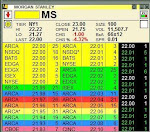SIT ON YOUR HANDS AND PROSPER
There are not too many jobs in which a person is rewarded for sitting on their hands but trading can be one of them. Jesse Livermore once said “After spending many years in Wall Street and after making and losing millions of dollars I want to tell you this: It never was my thinking that made the big money for me. It always was my sitting.”
In the early years of my day trading career I thought I had to be banging away at the keys and firing off trades every minute the market was open. A day seldom went by without me trading 100,000+ shares. At the end of the month there would be about 3 or 4 days of big losses that took a big bite out of my end-of-month profits. When I would go back and observe the market action on those days I would notice in most cases it was very choppy with no true direction and a lot of the times extremely low volume. The winning days weren’t a problem to come by but it wasn’t until I was able to eliminate those few big losing days that I started to really profit in day trading. Now the number of shares I trade per day might range from 20,000 on the uneventful days to 200,000 on really good ones.
Here are some ways I learned to sit, be patient and avoid the big losing days.
Don’t be anxious – There are 6.5 hours in the trading day so be patient and try to avoid trading the first 15 to 20 minutes. Use this time to observe and get a feel
Always have a reason to enter a trade – Stop guessing. Trade as if you were training other traders and being held accountable for each trade. (Trust me on this one.) Observe yourself trading with discipline.
Probe (Scale in) -- If you want to take a position of 300 shares enter it 100 shares at a time. If you’re wrong the loss isn’t as bad and you spend less in commissions.
Have a stop-loss every day – Every trader should have a maximum amount they can afford to lose each day. When you hit it STOP trading!
Avoid tight ranges and low volume – This is a time to sit on your hands. Wait patiently for the market to pick a direction. Narrow range days often follow a giant move from the day prior. Buyers and sellers battle for control after such moves. When you spot this scenario, stand aside and wait to see who wins. Then join that team. If you insist on trading a narrow range day actively, then fade moves and go for small scalps.
Day Trading is a profession, so try to treat it like a business and not like a black jack table. Trade when it’s hot and learn to sit on your hands when it’s not. There aren't too many businesses that end each day in 100% cash with no inventory. Protect that cash.
Saturday, August 2, 2008
Subscribe to:
Post Comments (Atom)







No comments:
Post a Comment